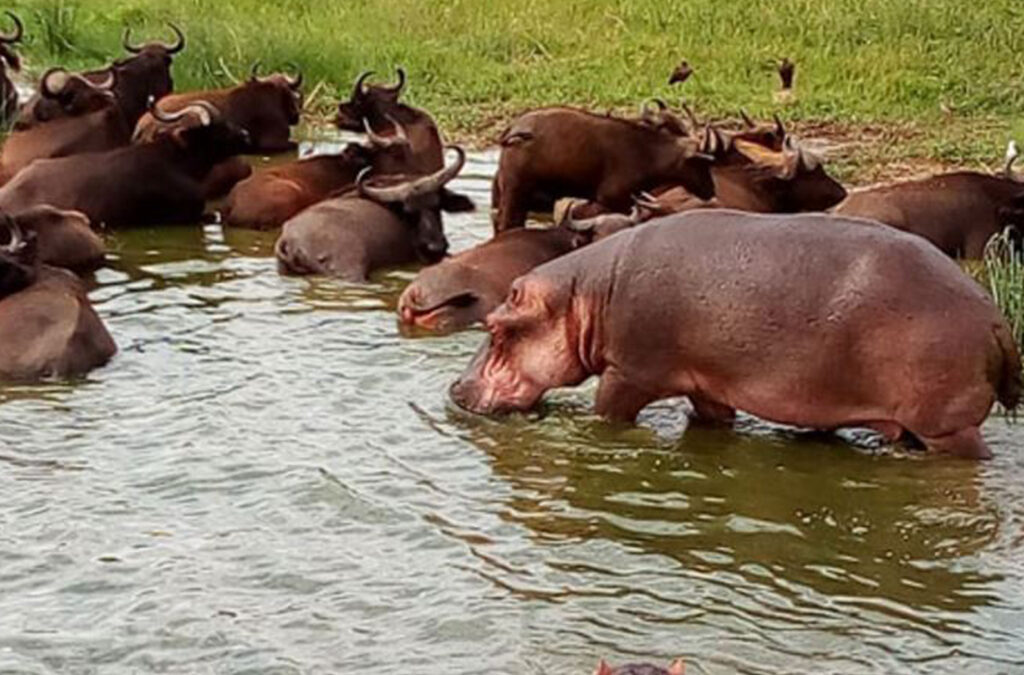
Things to do and see around Lake Mutanda
June 26, 2025
Cruising the Nile Delta in Murchison Falls National Park
June 27, 20256 Surprising Facts About Hippos in Africa

6 Surprising Facts About Hippos
There’s something almost magical about watching a hippopotamus emerge from a river at dusk. With their massive bodies, comically tiny ears, and eyes peeking just above the water’s surface, hippos often seem like characters out of a children’s storybook. But behind their calm, lumbering appearance lies a fascinating world of unexpected behaviors, unique adaptations, and wild surprises. These incredible river giants of Africa hold secrets that challenge what most people think they know about wildlife. If you’ve ever underestimated the hippopotamus, here are six surprising facts that will completely transform your view of these water-loving wonders.
1. Hippos Aren’t Really Fat They’re Muscular Powerhouses
At first glance, hippos might look like they’re all belly and blubber, but beneath that round exterior is a body packed with muscle. An adult male hippo can weigh over 3,000 kilograms (about 6,600 pounds), and much of that is raw strength. These animals are built for power, not speed, yet they can charge faster than a human can run. They may look soft, but they are among the most dangerous and formidable animals in Africa. Their massive jaws, capable of opening up to 150 degrees, can crush bones in a single bite. Hippos aren’t just big; they are beasts of pure muscle.
2. They Can’t Actually Swim But They Move Gracefully Underwater
Despite spending most of their lives in water, hippos don’t swim in the traditional sense. Instead of paddling like fish or other aquatic mammals, they propel themselves underwater by pushing off the riverbed and gliding in a kind of underwater gallop. They are perfectly adapted for life in water, holding their breath for up to five minutes and sealing their ears and nostrils when submerged. Watching a hippo rise and sink effortlessly in a lake or river, you would never guess that they can’t swim. It’s a beautiful illusion that showcases just how specially designed they are for their watery world.
3. They Produce Their Own Sunscreen – Naturally
One of the most astonishing biological adaptations of the hippo is its natural sunscreen. Hippos secrete a reddish-orange oily fluid from their skin, which not only helps protect them from the harsh African sun but also has antibacterial properties. This fluid, often nicknamed blood sweat, isn’t actually sweat or blood, but it gives their skin a glossy red tint in the sunlight. This amazing secretion prevents sunburn and heals wounds, acting as both a moisturizer and a shield. It’s nature’s skincare routine at its finest.
4. They Are Surprisingly Vocal and Social
While they may seem quiet and solitary at first glance, hippos are among the most vocal animals in Africa. They communicate through a wide range of grunts, wheezes, bellows, and even underwater clicks. One of the most intriguing aspects is their ability to vocalize both above and below the water simultaneously. These sounds carry through rivers and lakes, helping members of a pod stay connected even when out of sight. Hippos are social animals that live in groups of up to 30 individuals, led by a dominant male. These gatherings, called pods, herds, or bloats, are full of subtle interactions and hierarchy. Their communication and community dynamics are as rich and complex as many primates.
5. They Are Vital Ecosystem Engineers
Beyond their charismatic presence, hippos play a critical role in maintaining the ecosystems where they live. As they move between land and water, they help shape riverbanks, create channels, and spread nutrients. Their dung is a key source of organic material that supports aquatic life, especially fish and other small organisms. Hippos effectively connect land and water habitats, cycling nutrients between the two and ensuring the health of both environments. They are silent caretakers of Africa’s freshwater systems, shaping the landscapes in ways few people ever realize.
6. They Are Fiercely Territorial but Mostly Vegetarian
Hippos are herbivores, feeding mainly on grass during their nightly foraging trips. Yet, their behavior is anything but passive. In the water, especially among males, territorial disputes are common and can be intense. A dominant male will patrol and defend his stretch of river fiercely, using his huge size and powerful jaws to keep rivals away. Surprisingly, even though they don’t eat meat, there have been rare instances of hippos scavenging or showing carnivorous behavior, especially in times of extreme stress or drought. While it’s not typical, it’s a reminder that these animals are far more complex than their reputation as peaceful grazers might suggest.
Why Hippos Deserve Your Admiration
The hippopotamus is an animal full of contradictions. They are graceful yet powerful, peaceful yet dangerous, social yet territorial. Whether you spot one in Uganda’s Murchison Falls National Park or along the banks of the Mara River in Kenya, encountering a hippo in the wild is an unforgettable experience. Watching them glide through the water or emerge in the golden light of the African sunset reminds us just how wild, mysterious, and beautiful nature can be.
These creatures have survived for millions of years, adapting to the rhythms of Africa’s rivers and plains. Yet today, they face threats from habitat loss, human-wildlife conflict, and poaching. As we learn more about hippos, it becomes increasingly clear how important they are not just to the African wilderness, but to the ecological balance of our planet.



